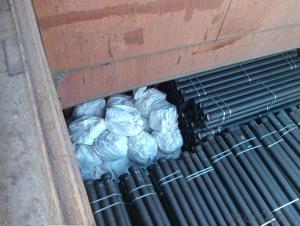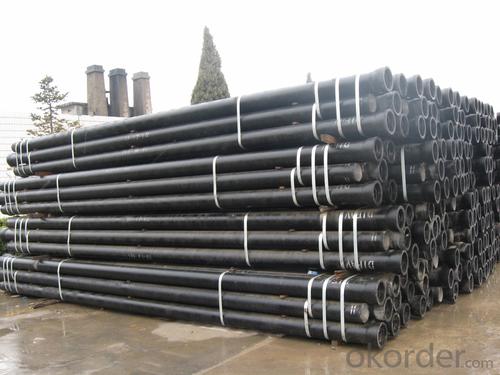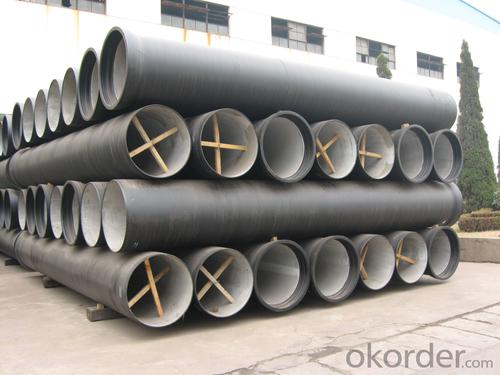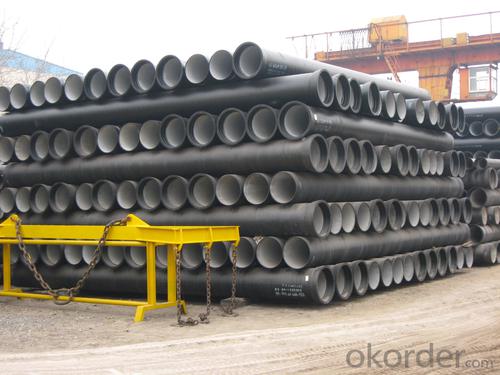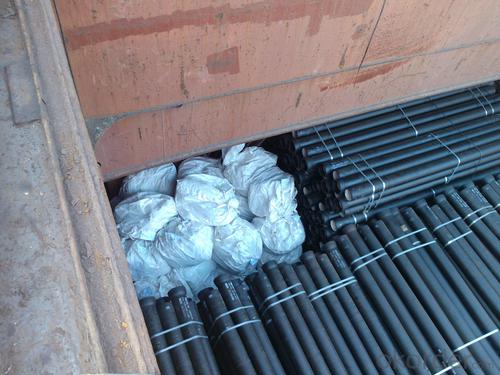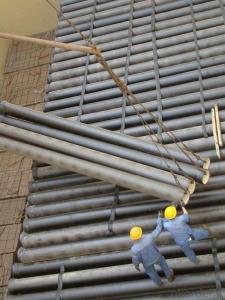DUCTILE IRON PIPE DN250 K8/C/K9
- Loading Port:
- China Main Port
- Payment Terms:
- TT or LC
- Min Order Qty:
- 20 m.t.
- Supply Capability:
- -
OKorder Service Pledge
OKorder Financial Service
You Might Also Like
Specification:
1) The standard of pipe: ISO2531:1998, K9
2) Effective length: 6m
3) Inner cement line: Portland cement line as per ISO4179
4) Zinc coating: at least 130g/m2 as per ISO8179
5) Bitumen painting: at least 70um as per ISO8179
6) With 100% quantity of NBR ring, or SBR ring, or EPDM ring as per ISO4633
7) DN80mm-800mm
8) High strength, lighter than grey iron, good corrosion resistance, no furring, small flow resistance, easy fixing, long life tome about 100 yeas
9) Produced by Hangzhou chunfeng machine
10) Checked by automatic inspection equipment
11) Composition:
Chemical composition | ||||||
Chemical composition | Ductile Cast Iron Pipe (%) | Grey iron pipe (%) | Steel pipe (%) | |||
C | 3.5-4.0 | 3.2-3.8 | 0.1-0.2 | |||
Si | 1.9-2.6 | 1.4-2.2 | 0.15-0.4 | |||
Mn | 0.15-0.45 | 0.4-0.6 | 0.3-0.6 | |||
P | ≤0.06 | ≤0.3 | 0.02-0.03 | |||
S | ≤0.02 | ≤0.1 | 0.02-0.03 | |||
Mg | 0.03-0.06 | |||||
12) Feature:
Mechanical properties | ||||||
Ductile Cast Iron Pipe | Grey Iron Pipe | Steel Pipe | ||||
Tensile Strength(Mpa) | ≥420 | 150-260 | ≥400 | |||
Yield Strength(Mpa) | ≥300 | No Confirmation | No Confirmation | |||
Bending Strength(Mpa) | ≥590 | 200-360 | ≥400 | |||
Elongation (%) | ≥10 | Neglected | ≥18 | |||
Brinell Hardness(HBS) | ≤230 | ≤230 | About 140 | |||
13) T type mechanical joint
14) Packing: in bulk or container
Our main material are all carbon steel and alloy steel ,such as :aisi1020 1035 1045 1055 s20c s35c s45c s55c ss400 a36 c20 c35 c45 ck45 aisi4140/scm440 aisi4340/40crnimoa aisi8620H,40cr,gcr15,sae52100,20Mn,40Mn,St52,St37,S235JR,etc
- Q: What is cast iron pipe, specification for cast iron pipe?
- According to the different casting methods, the labor intensity is divided into continuous cast iron pipes and centrifugal cast iron pipes, in which the centrifugal cast iron pipes are divided into two kinds: sand mould and metal mould. Divided into gray cast iron pipe and nodular cast iron pipe according to different material. Rubber ring seals for flexible interfaces,
- Q: How can the ductile iron pipe elbow be fixed?
- Ductile cast iron pipe in the groove pipe connection technology is also called the lathedog connection technology, has become the most liquid and gas pipeline connection technology, although this technology is later than foreign in domestic development time, but because of its advanced technology, domestic market quickly received. Since 1998, it has been developed and applied in just a few years. It has gradually replaced two traditional ways of pipe connection, such as flange and welding. Not only technically more mature, the market is generally recognized, but also by the national laws and regulations actively guide the policy. The application of grooved pipe connection technology makes the complex pipe connection procedure simple, fast and convenient. Took a big step forward in pipeline connection technology.
- Q: What are the typical installation methods for ductile iron pipe?
- Proper installation and functionality of ductile iron pipe involve a series of steps. Firstly, the trench must be excavated to the required depth and width, considering the pipe diameter and bedding material. Careful preparation of the trench bottom is then necessary to remove sharp objects or debris that could damage the pipe. Next, an even layer of suitable bedding material, like sand or fine gravel, is placed along the trench bottom to support the pipe and prevent point loading. This bedding material is compacted to ensure stability and eliminate any voids that may cause pipe settling or shifting over time. Once the bedding is set, the ductile iron pipe is gently lowered into the trench, taking precautions to protect the pipe's coating. Regular intervals along the trench, appropriate pipe supports or blocks are used to align and support the pipes. After proper alignment, the joints are assembled by lubricating and inserting a rubber gasket into the bell end of the pipe. The spigot end of the adjacent pipe is then inserted into the bell end, creating a secure and watertight seal. With joints assembled, the backfilling process begins. Backfill material, typically a combination of native soil and select backfill, is carefully placed around the pipe in layers and compacted to ensure stability and prevent voids. Gradual backfilling allows for proper compaction without excessive pressure or pipe damage. Finally, the trench is fully backfilled and compacted to adequately support and protect the pipe from external forces. Surface restoration is then performed to minimize disruption caused by the installation process and restore the area to its original condition. It is important to note that installation methods may vary based on project specifications, local regulations, and engineering recommendations. Consulting the manufacturer's guidelines and working closely with qualified professionals is essential to ensure proper installation of ductile iron pipe.
- Q: What are the typical joint restraint requirements for ductile iron pipes?
- The typical joint restraint requirements for ductile iron pipes include the use of mechanical joint restraints or push-on joint restraints. These restraints are necessary to prevent the pipe from separating or pulling apart under various operating conditions, such as internal pressure, external loads, and ground movement. Mechanical joint restraints are commonly used in applications where the pipe is subjected to high internal pressures or external loads. They typically consist of a gland and a follower gland, which are tightened around the pipe joint using bolts or clamps. This helps to secure the joint and prevent any movement or separation. Push-on joint restraints, on the other hand, are used in applications where the pipe is not subjected to high internal pressures or external loads. These restraints are designed to provide a seal and prevent the pipe from pulling apart due to ground movement or other external forces. They are installed by pushing the pipe into the joint and securing it with a restraining ring or collar. In addition to these joint restraints, it is also important to consider the bedding and backfill requirements for ductile iron pipes. Properly compacted and supportive bedding and backfill materials help to distribute the loads and provide stability to the pipe system, further enhancing its resistance to joint separation. It is worth noting that the specific joint restraint requirements for ductile iron pipes may vary depending on the project specifications, pipe size, and operating conditions. Therefore, it is important to consult the manufacturer's recommendations and engineering standards to ensure the proper selection and installation of joint restraints for ductile iron pipes.
- Q: Are ductile iron pipes resistant to chemicals?
- Generally, ductile iron pipes exhibit resistance to chemicals. Ductile iron, a variety of cast iron, is fortified with small amounts of magnesium to enhance its strength and ductility. This alloying process effectively heightens its ability to withstand corrosion and chemical attack. Ductile iron pipes have found extensive use in multiple applications, such as water supply, wastewater treatment, and industrial piping systems, where they may encounter a range of chemicals. Nevertheless, it is crucial to acknowledge that the resistance of ductile iron pipes to chemicals can vary based on the specific type and concentration of the chemical in question. Thus, it is advisable to seek guidance from the manufacturer or a qualified engineer to ascertain the suitability of ductile iron pipes for a particular chemical application.
- Q: What are the different joint types available for ductile iron pipes?
- Ductile iron pipes offer various joint types that are essential for maintaining the integrity and reliability of the pipeline system. 1. The push-on joint is the most prevalent joint used for ductile iron pipes. It involves inserting a rubber gasket into the bell end of the pipe and then pushing the spigot end into the bell, ensuring a tight seal. This joint is easy to assemble, quick, and has excellent resistance against soil movement and water pressure. 2. The mechanical joint involves a gland and follower that are secured around the spigot end of the pipe using bolts and nuts. It provides a robust and durable connection and is commonly used for larger diameter pipes or applications that expect higher pressure or thrust loads. 3. Flanged joints are utilized when connecting pipes to other components like valves or fittings. The pipe ends are machined and equipped with flanges that are bolted together using gaskets, ensuring a secure connection. These joints find frequent use in industrial applications or situations requiring frequent disassembly. 4. Restrained joints are designed to withstand significant external forces and prevent separation or pulling apart of the pipe. They typically combine mechanical joint components, such as bolts and glands, with additional restraining elements like welded or bolted-on restraints. These joints are commonly employed in high-pressure applications or situations where substantial external forces are present. Choosing the appropriate joint type is crucial and depends on factors such as pipeline design, operating conditions, and installation requirements. Seeking guidance from experienced engineers or pipe manufacturers can aid in determining the most suitable joint type for a specific ductile iron pipe application.
- Q: Are ductile iron pipes suitable for sewer force mains?
- Yes, ductile iron pipes are suitable for sewer force mains. They have proven to be a reliable and durable choice for transporting wastewater under pressure. Their high tensile strength and resistance to corrosion make them ideal for withstanding the demanding conditions of sewer force mains.
- Q: Do ductile iron pipes require pressure testing before installation?
- Before installation, it is necessary to conduct pressure testing on ductile iron pipes. This step is critical in guaranteeing the pipes' integrity and safety. Its purpose is to detect any leaks, weaknesses, or defects before the pipes are put into service. Pressure testing involves subjecting the pipes to higher-than-normal operating pressures to determine if they can endure the expected pressure without any failures. By doing so, this process prevents potential issues such as leaks, bursts, or failures that could result in water loss, property damage, or accidents. Hence, pressure testing is an indispensable requirement for ductile iron pipes to ensure their reliability and long-term performance.
- Q: How are ductile iron pipes protected against erosion caused by high-velocity flow?
- Ductile iron pipes are protected against erosion caused by high-velocity flow through various methods and techniques. One common method is the application of protective coatings on the inner surface of the pipes. These coatings create a barrier between the flowing water and the pipe material, reducing the abrasive effects of the high-velocity flow. The coatings used may include epoxy, polyurethane, or cement-mortar lining, depending on the specific requirements of the application. Additionally, manufacturers often design the pipes with increased wall thickness in areas that are prone to erosion, such as bends or areas where the flow velocity is highest. This extra thickness provides additional strength and resistance against erosion. Another technique used to protect ductile iron pipes from erosion is the implementation of flow control devices, such as flow deflectors or velocity-reducing fittings. These devices help to redirect the flow and reduce its velocity, thereby minimizing the impact on the pipe walls. Regular maintenance and inspections are also crucial in preventing erosion. By monitoring the condition of the pipes and identifying any signs of erosion early on, appropriate measures can be taken to address the issue before it escalates. This may involve repairing or replacing damaged sections of the pipes, as well as implementing erosion control measures such as sediment filters or flow restrictors. Overall, a combination of protective coatings, design considerations, flow control devices, and proactive maintenance strategies are employed to ensure that ductile iron pipes are adequately protected against erosion caused by high-velocity flow.
- Q: What is the DN400 installation charge for ductile iron pipes?
- Labor cost: refers to the total amount of wages according to the provisions of the payment to the construction and installation works in the production of workers and ancillary production units of workers costs.
Send your message to us
DUCTILE IRON PIPE DN250 K8/C/K9
- Loading Port:
- China Main Port
- Payment Terms:
- TT or LC
- Min Order Qty:
- 20 m.t.
- Supply Capability:
- -
OKorder Service Pledge
OKorder Financial Service
Similar products
Hot products
Hot Searches
Related keywords



